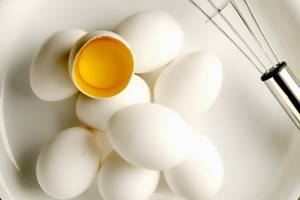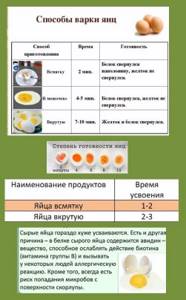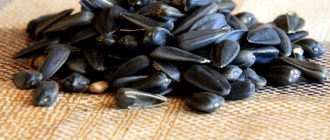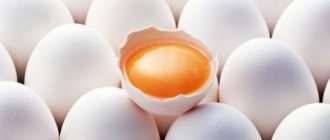Which eggs are healthier: boiled or raw?
Medicine has long proven that of all existing types of protein, egg protein is the best.
It is characterized by an optimal amino acid composition for humans, while being absorbed faster and easier by the body. The yolk also has a lot of advantages - it is low in calories and nutritious. So eating eggs is necessary and healthy, no one argues with that. Another thing is what form you should eat eggs in to get the maximum benefit from it. There are two main options here - raw or boiled. Fried eggs are not considered from this point of view , since in this case the beneficial substances are mostly destroyed, and at the same time carcinogens hazardous to health are released. So the question should be exactly this: which eggs are healthier: boiled or raw.
Digestibility of boiled and raw eggs
Since the main advantage of eggs is their increased digestibility, it would be advisable to start considering the problem posed precisely with this. During the cooking process, egg whites are exposed to extreme heat, causing them to denature.
Denatured protein is absorbed much easier , since it has already been partially processed and the body does not have to spend additional energy on it. On the other hand, during prolonged heat treatment, a certain part of the amino acids is destroyed, so the most correct thing would be to boil the eggs soft-boiled . Nutritionists classify hard-boiled eggs as foods with a negative calorie content, since the body spends more on processing them than it ultimately receives.
It is also recommended to eat boiled eggs immediately after cooking, since when stored even in the refrigerator, harmful substances, such as ammonia, hydrogen sulfide and hydrogen phosphide, begin to be produced within a few hours.
Thus, the answer to the question, which eggs are healthier, boiled or raw , from the point of view of protein digestibility is obvious - of course, boiled, and soft-boiled is better.
Security questions
There is another side to this issue - security. The fact is that the surface of the shell is a collection of various bacteria , which cannot be completely eliminated even if you thoroughly wash each egg in running water. Some harmful microorganisms will still survive, and in order to multiply again to their previous concentrations, a few minutes will be enough for them.
In addition, to become infected with, say, salmonella, it only takes a few bacteria to enter the body. During the breaking of eggs, bacteria from the shell can get into the white, which can lead to quite serious consequences. Moreover, even minor heat treatment kills all harmful microbes, making eggs safe for consumption.
Remember, you should never eat raw eggs whose shells have even a small crack . This will be enough for bacteria to penetrate inside and infect not only the white, but also the yolk.
As an additional touch to the question of which eggs are healthier, boiled or raw, from a safety point of view, we can provide information according to which, under the influence of high temperatures, the allergenic properties of eggs are significantly reduced.
In what form is it healthier to eat yolk?
But the yolk, unlike the white, is healthier to eat raw. This way, its nutritional properties are better preserved, and the amino acids included in the composition are not destroyed and bring maximum benefit. In addition, adding a small amount of vegetable oil to the yolk improves the digestibility of its constituent fat-soluble acids.
However, it is necessary to observe certain precautions. So, to protect yourself from salmonellosis infection, you can sprinkle the yolk with crystals of citric acid, then shake it thoroughly until smooth. An acidic environment kills microbes no worse than high temperature, so you don’t have to worry about the safety of the yolk prepared in this way.
In the absence of citric acid, you can use table vinegar. The main thing here is to accurately determine the required amount of acidic ingredient, since if it is not enough, the effect on microbes will be negligible. If you overdo it, the taste of the dish will be such that it will be impossible to eat.
So, to summarize, which eggs are healthier, boiled or raw? The most correct option would be to use soft-boiled eggs. In this case, the denatured protein is absorbed much more completely and quickly, while at the same time retaining its beneficial properties to the maximum.
Hard-boiled eggs are digested by the body with great difficulty and during the cooking process they lose a significant part of their positive qualities. It is not recommended to consume raw eggs, as in this case the risk of infection increases significantly and the load on the gastrointestinal tract increases.
Which scrambled eggs are healthier?
Scrambled eggs made from fresh ingredients are considered healthier. You can increase the nutritional value of a dish by adding vegetables to it. Tomatoes, green beans and bell peppers are most often used as additional ingredients. The taste of fried eggs is well complemented by finely chopped greens.
The benefits of scrambled eggs with tomatoes will be more pronounced if you use olive or coconut oil for frying. For cooking, it is advisable to use a non-stick stove. You can also get rid of the yolks or reduce them to a minimum. The ideal ratio would be 3 whites to 1 yolk.
Scrambled eggs with onions also have significant benefits. Due to its addition, the dish has a bactericidal effect and stimulates the internal secretion of the gastrointestinal tract. In addition, onions contain substances that have a beneficial effect on the condition of blood vessels.
Are chicken eggs healthy?
The egg, which in the first centuries became a symbol of life, today causes a lot of controversy and has both its fans and inveterate opponents. Therefore, when we add eggs to our diet, we ask ourselves whether we are doing the right thing. It's worth considering the scientific facts.
Since ancient times, eggs have been considered one of the most valuable products that satisfy the demand for all the nutrients necessary for the proper development and functioning of the body. In the 1970s, it was recognized as harmful, and nutritionists of that time advised significantly limiting it in the diet. What led to such different relationships? At that time, studies were conducted that showed that too much cholesterol in our bloodstream increases the likelihood of cardiovascular disease. And because the egg (or rather the yolk) provides a large amount of this component, it was concluded that it is harmful and it was recommended to reduce its consumption.
Today we have the results of new research, and the egg is regaining its former popularity. The World Health Organization and its experts allow you to eat up to 10 eggs a week (including eggs used to make cakes, pasta, etc.) without worrying about your health. What components does a chicken egg contain?
Cholesterol and fats
One egg contains about 216 mg of cholesterol, which is slightly less than the body's daily requirement for this substance. And although it is the “honorable builder” of cell membranes and without it none of the cells could function, studies have confirmed that its excess can provoke the deposition of atherosclerotic plaques in blood vessels, which increases the risk of atherosclerosis, heart attack or stroke.
However, saturated fats in foods have also been shown to increase plasma cholesterol levels. In this regard, the egg is not dangerous, since the fat it contains contains 29% saturated fatty acids, 44% monounsaturated fatty acids and 11% polyunsaturated fatty acids.
Such a healthy “profile” of fat allows you to neutralize the consequences of cholesterol, which entered the body along with the egg. Interesting studies were conducted at the University of Kansas. Three researchers found that the cholesterol found in eggs does not contribute to the development of atherosclerosis because it is accompanied by another compound, phosphatidylcholine. This substance reduces the absorption of cholesterol from our digestive system. In addition, as a component of nerve cell membranes, it is of great importance for the normal development of embryonic brain tissue.
It is worth noting that the level of cholesterol in the blood of our body is subject to adjustment. Most of this substance contained in our body does not come from food, but from our own “production”. The main "producer" is the liver, but other organs (for example, skin or brain) also contribute.
If our body receives a large amount of cholesterol, these organs receive a signal to stop its synthesis. Naturally, chronic uncontrolled consumption of foods high in this substance can disrupt the regulatory mechanism. In this regard, it is accepted that food should deliver no more than 300 mg of cholesterol to our body daily. This statement applies to healthy people.
Egg diets
Based on the benefits of the product, nutritionists are creating more and more diets where eggs are the main component. Eggs by themselves do not contribute to weight loss when losing weight, but in combination with other products they are a reliable tool in the fight against extra pounds.
Egg-citrus diet
This unusual combination is used by many celebrities to lose weight and maintain body elasticity. Typically, grapefruit is used as citrus. This fruit is known for its fat burning properties.
"Positive" dyes in eggs
Egg yolk also contains the dyes xanthophyll and lutein. The first, like lecithin, prevents the accumulation of deposits on the walls of the arteries. Therefore, taking into account all the information, it cannot be said with certainty that eggs are harmful and, due to their high cholesterol content, can increase the likelihood of cardiovascular diseases. Lutein mainly accumulates in the macula and retina, protecting them from UVA and UVB radiation and preventing damage to the retinal capillaries.
What is the benefit

Chicken eggs bring great benefits and have little harm. They are used for general strengthening and prevention of certain diseases. They contain substances that are necessary for the proper functioning of basic systems and are not synthesized by the body.
- They should be eaten during pregnancy. Choline contained in their composition is necessary for the proper development of the fetus. It is recommended to use them in small quantities during lactation to replenish the lack of minerals in the body;
- Lecithin, which the yolk is rich in, improves the functioning of the liver and brain, helps destroy plaques on the walls of blood vessels;
- The beneficial properties of eggs are used to improve the condition of skin, hair and nails. They can be consumed raw, or special nourishing masks can be prepared that have excellent moisturizing properties;
- The proteins contained in protein are essential for muscle growth. This property is actively used by athletes.
Many people believe that consuming this product is harmful to health due to the high amount of cholesterol. There is a lot of controversy surrounding it. The most widespread opinion is that it is the cause of the development of cardiovascular diseases.
Cholesterol is produced by the body to ensure normal digestion and hormone synthesis. It is a component of cell membrane elements. Two types of substances are responsible for its movement:
- LDL – low density lipoproteins;
- HDL is high density lipoprotein.
The first type has earned the reputation of being “bad.” If its concentration in the blood increases, then there is a risk of plaque formation that impairs blood flow. The second type is considered “good”: it transports fats to the liver, which then removes the carrier from the body.
Negative consequences occur when there is a high accumulation of this substance. But eating foods that contain cholesterol has virtually no effect on its level in the blood. The body reduces its own synthesis of the substance, so it does no harm.
Negative effects can occur in a person who does not have good eating habits and consumes large amounts of other foods high in fats and trans fats. This leads to an imbalance of lipoproteins - HDL becomes more than LDL. Therefore, when eggs are consumed in reasonable quantities, the cholesterol they contain does not have a detrimental effect on blood vessels and the heart.
When eating eggs, pay attention to:
- Allergies . Egg white (second only to cow white) is the most common cause of allergies in children. Therefore, children with a high risk factor should not consume eggs before the age of 12 months. The reassuring fact is that allergenic properties are minimized when eggs are hard-boiled; - Avidin. This element, found in protein, blocks the absorption of vitamin H (biotin). However, heat treatment destroys avidin. Further research has shown that the concentration of biotin in an egg is sufficient to not be afraid of frequent egg consumption. This will not lead to biotin deficiency in our body; - Salmonella. Consuming raw eggs can cause salmonellosis, a dangerous intestinal infection. Heat treatment (cooking for 15 minutes, frying the eggs on both sides) destroys these bacteria. It is important to wash eggs before using to remove salmonella as they are located on the shell. If the eggs are cracked, then they should not be used for scrambled eggs, because... Salmonella may already be inside the egg, and there is insufficient processing when frying the eggs. There is a theory according to which salmonella are found only on white egg shells, while brown ones are clean, but it has not been scientifically confirmed.
Practical tips for eating eggs
- Soft-boiled eggs are best digested (4 minutes). When boiling hard-boiled eggs, we must take into account significant losses of vitamins and a decrease in nutritional value. For soft-boiled eggs, use only whole, undamaged eggs (even small ones), pre-washed with warm water and soap.
- A greenish rim around the yolk does not mean the egg is old. This indicates that it was cooked for a long time (more than 10 minutes). Then a reaction of sulfur with iron occurs, resulting in a greenish color.
- The protein coagulates at a temperature of 60 degrees, which allows you to fry eggs in oil. The oil begins to smoke at a temperature of 207 degrees, at which time it begins to release toxic acrolein, so you need to fry the eggs over low heat.
- Although butter is allowed, it is preferable to use cholesterol-free vegetable oils for cooking scrambled eggs, so you can allow not one, but two eggs daily;
- Eggs have the ability to absorb foreign odors. Low temperature significantly slows down this process, but does not completely eliminate it. During storage, eggs also age, which entails a decrease in their nutritional value. Therefore, the maximum shelf life of eggs is three weeks (in the refrigerator, of course).
Everything you need to know about the best source of protein - chicken eggs
Running enthusiast and editor of SportPriority
“Eggs are the reference source of protein for an athlete; other protein sources are judged against them. This is the most popular, cheapest and highest quality product, which is simply necessary for building muscle mass, so bodybuilders literally buy whole trays of chicken eggs and eat them every day. Read about why you should eat eggs, how best to cook them and how not to get harmed from them.”
Protein in whites and protein in yolks
Egg white suits our body better than any other protein that should be taken for effective training. It is perfectly digestible and consists almost entirely of albumin (or ovoalbumin, 10%) and water (90%). In terms of absolute values, one egg, including the yolk, contains about 6-7 grams of albumin, and the yolk also contains ovoglobulin, coalbumin, ovomucoid, ovomucin, lysocin and avidin.

A chicken egg can weigh from 35 grams (3rd category) to 75 grams (highest category), it contains only 4 grams of fat (monounsaturated and polyunsaturated (Omega-3) fatty acids), carbohydrates - 0.5 grams, lecithin - 150 mg. The remaining weight in small quantities consists of various vitamins (including A, E, K, D and B12) and minerals (calcium, zinc and iron), and water.
The composition also contains riboflavin, folic acid and cholesterol, which is the main component in the synthesis of testosterone and does not increase the total level of cholesterol in the blood. The energy value of an average egg is 157 kcal per 100 grams, and the biological value indicator is equal to one (a complete set of all essential amino acids).
Do you eat the whole thing or just the whites?
Very often on the Internet you can find recommendations to throw away the yolks or eat them in minimal quantities. The fact is that fats (even healthy Omega-3s) enhance the oxidation process and “waste” the body’s oxygen. Too many of these fats do not benefit the body, but the harm can be mitigated very simply - just consume natural antioxidants - beans, blueberries, cranberries and other berries, prunes, apples. Not only will they prevent oxidation, but they will also add more vitamins, metals and other substances to the diet.

Eating raw eggs is not recommended because they slow down the release of the enzyme trypsin - it affects the speed of digestion. Chicken eggs must be subjected to heat treatment, at least 70°C (at this temperature the trypsin inhibitor is destroyed). Cooking also kills harmful bacteria that can enter through or from the shell, and, of course, protects against salmonellosis, a common poultry disease.
You should not eat raw eggs
There is no need to be afraid of cholesterol in a chicken egg, especially for athletes who do not have any health problems associated with it. It will only strengthen the body’s cells and become a building material for new ones. This is especially true for a growing body and when muscle mass increases, when new fibers grow - in fact, this is what happens in bodybuilding, so cholesterol is simply necessary here.
What are the benefits of an omelet?
Many people are afraid of eating omelet, as it has a bad effect on the heart and blood vessels. Often rumors exaggerate the danger , this has been proven by independent studies that do not show an increase in blood cholesterol from such a breakfast. Frying in oil has a negative impact, but there are many ways to avoid such excesses. For example, steaming or cooking in a non-stick frying pan. Another danger exists in salmonellosis, but the egg inside is well protected by a film, and bacteria can be on top. Therefore, before cooking in any way, it is necessary to wash the shells in a soda solution. So an omelet is a good component of breakfast, which:
- Vitamin E in blood vessels increases elasticity, wounds, cuts and scratches heal faster.
- Vitamin A provides internal support to the skin, normalizes the oxidative process, and has a beneficial effect on vision.
- Calcium , which is included in the milk ingredient, will prevent the formation of osteoporosis and support bones.
- Strengthens the nervous system and hair.
- vitamin D to the body ; it does not disappear after heat treatment.
A whole set of useful things will be added to the body, where an overdose has not been noticed, since you won’t be able to eat a lot anyway, because the omelet is very nutritious.

What is the healthiest way to eat chicken eggs?
eggs contain many vitamins, minerals and microelements that are beneficial for humans. Therefore, it is recommended to take them raw. and only homemade ones. It’s unlikely that the eggs sold in supermarkets still contain these beneficial substances. and even better if these eggs are fresh. Can still be subjected to minimal heat treatment.
Eggs are a product about which there is a lot of contradictory talk about its consumption, including in what form to consume it.
Raw eggs can only be eaten if the poultry is domestic and the eggs are fresh, as you can get salmonellosis.
If you choose between raw and boiled eggs, then the latter are healthier. A boiled egg is a dietary product that is easily digestible and must be present in the diet so that the body receives nutrients and microelements. Of course, you should not overuse eggs if you suspect high cholesterol, excess weight, or atherosclerosis. On average, you can eat one egg per day.
If you compare boiled and fried eggs, the former have an advantage - fried products are not so dietary, they have more calories.
Eggs can also be baked and this is also tasty and healthy. You can cook eggs “in a bag” or make poached eggs.
Particularly nutritious are quail eggs, which are used in salads, for decorating snacks, and are useful for children.
It is best to eat boiled eggs so that the white is cooked and the yolk is runny. It doesn’t matter whether it’s homemade or store-bought, it’s better to cook it. Protein is not absorbed by our body in its raw form. Homemade ones are better in terms of the predominant content of nutrients. The cholesterol that this dietary product contains is healthy and in no case has a bad effect on the cardiovascular system. Cholesterol, like air, is necessary for the synthesis of hormones. And without hormones there is no harmony.)
I once watched a program on TV, and they said that boiled eggs are healthier for consumption than raw ones. Soft-boiled ones are especially useful. But raw chicken eggs are poorly absorbed by the body.
I would also like to add that only dietary chicken eggs are the healthiest. You can probably eat such fresh chicken eggs only in the village. They stay fresh for up to 10 days, and over 10 days and up to 30 - this is already a table chicken egg. It is already considered less useful.
In what form should you eat chicken eggs? Some say that homemade raw eggs are healthy. Yes, homemade ones are definitely better: they contain the same amount of protein, but there are more vitamins and minerals. But raw eggs are generally not recommended. I saw a person who fell ill with salmonellosis - I don’t wish it on my enemy. So definitely cook. Useful - steam omelette, fried eggs in a small amount of oil.
Well, if it’s most useful, then it’s done in the following way - take an egg from the nest and break it into something, then carefully take the embryo with a spoon and put it in a glass (or something else) with water and drink it. Use the remaining egg as you wish. You can cook a poached egg - tasty and healthy.
, chicken eggs are an essential component . Experts have widely differing opinions about the best way to prepare them.
For diseases of the nervous system, raw chicken eggs are useful. The yolk is healthier in its raw form. Therefore, to avoid salmonellosis, it is better to add vinegar or citric acid to the yolk. Fat-soluble acids are better absorbed, so eating the yolk with vegetable oil is most beneficial.
It is better to choose boiled ones if you choose between boiled and fried eggs. This hard-boiled product is less digestible, since beneficial amino acids are destroyed during long-term temperature treatment. A product with a negative calorie content is hard-boiled eggs. The body needs to expend more calories than they contain in order to digest them.
When preparing soft-boiled chicken eggs, this healthy product is best absorbed.

It is actually very beneficial to consume raw eggs. Because it is the raw egg that contains many elements necessary for the body. And most of them die during heat treatment.
How to choose

There is an opinion that the naturalness and beneficial properties of the product depend on the color of the shell - white or brown eggs have different chemical compositions and effects on the body. However, the color of the shell is just a genetic feature that depends on the breed and color of the chicken's plumage.
Birds that are snow-white carry eggs of the appropriate color, while birds that are brown, golden or spotted carry brown eggs. Moreover, they have identical chemical composition.
To choose a fresh and high-quality product that can be consumed raw, you should adhere to the following recommendations:
- Hold it in your hand, feel the weight. The fresh product seems a little heavier because its contents have a denser consistency;
- If there is an ovoscope at a retail outlet, then you should illuminate it with this device;
- View labeling. The letter “D” indicates that the product can be stored for no more than a week, and the letter “C” - no more than a month. It is preferable to choose the first option;
- Carefully inspect the packaging and assess the condition of the eggs. If they are sticky, it means some of them have been broken. A negligent attitude towards cargo transportation suggests that the carrier could have neglected storage rules. Such products are not worth buying.
- Omega-3 labeling on packaging indicates a high fatty acid content. This means that the birds were fed special food enriched with valuable components, which has a positive effect on the final product.
It is also believed that a bright yolk indicates high quality. This statement is fundamentally incorrect. Its color depends on the food the chicken ate. If it contained coloring substances - lutein, xanthophyll or yellow pigments, then the yolk will acquire a rich orange color.
And if there are no such substances in food (for example, in alfalfa), then there will be no corresponding pigment in the yolk. Many manufacturers use this trick and deliberately add dyes to the food. Therefore, you should not chase bright colors. It does not guarantee high quality at all.
Both small and large eggs are equally useful. Their composition depends on the diet of the laying hen. The second type is more expensive, but the difference in price is due only to their size.
It is almost impossible to confuse a chicken and a duck egg. The second is distinguished by its large size - its weight is about 90 g, which is 1.5 times more than the first. And if you look at a goose embryo, both previous varieties will seem like babies - its weight is approximately 200 g.
Are raw ones healthier than cooked ones? The most common myths about eggs

We can cook eggs in different ways. Boil hard-boiled, soft-boiled, in a bag or poached. We eat scrambled eggs for breakfast, add them to salads, use them as an ingredient for any type of dough, and prepare filling for various pies. There are many myths about eggs that contain conflicting information about their benefits and possible harm. Perhaps no food product has suffered as many accusations and persecutions as ordinary eggs. According to some people, we should not eat them because they contain high levels of cholesterol. Let's try to figure out whether they are as harmful as many people think? In this article, we will look at all the most common myths and help you understand which ones are right and wrong regarding this product.
People whose cholesterol levels rise quickly should not eat eggs

People with high cholesterol are advised not to eat certain foods that raise cholesterol levels. Such people should not eat eggs at all.
Yolks contain more fat and cholesterol than whites. But not all fats are bad. Any high quality natural product cannot be harmful. Only quantity can be beneficial or harmful. You shouldn't eat three eggs for breakfast every day, but you can include them in your diet.
Abuse of eggs can actually cause an increase in cholesterol, which, in turn, will attack the pancreas and liver. People who suffer from cardiovascular disease and diabetes should not consume more than three eggs per week.
Possible contraindications
Like any food, eating scrambled eggs or boiled eggs can cause an allergic reaction if the consumer is allergic to the product. You should not consume such treats if you have high cholesterol. It is necessary for people with lipid metabolism disorders to reduce such foods, as well as people with diseases:
Regardless of health, it is better to bake an omelet in the oven without oil. Use the following ingredients as additives:
- Skim milk.
- Gribov.
- Greenery.
- Tomatov.
- Bell pepper.
If a person wants to lose weight, he should not eat egg yolks
Most likely, this myth arose due to the large amount of fat in the yolk. This is why some people refuse to use them because they are afraid of gaining weight. Egg yolks contain additional proteins and nutrients that promote calcium absorption. They also contain choline, which ensures excellent liver function. In addition, experts note that after breakfast with an egg, the feeling of fullness lasts much longer. Therefore, people eat less at their next meal, which is known to reduce the risk of obesity.
Lutein and similar substances are absent from egg whites. According to the American Heart Association, you can include one egg per day for a healthy diet.
What can be concluded
Experts carefully examined the product in all methods of its preparation and concluded that moderation is necessary in everything . Only if there are individual contraindications, eggs should be excluded from the diet. In other cases, you should not deprive the body of a storehouse of valuable substances. Nutritionists recommend:
- If a person has excess cholesterol in the blood, the consumption of eggs should be reduced to 3 eggs within 7 days.
- In the absence of contraindications, the norm is to consume 1 egg per day or 7 eggs per week.
- Children who do not suffer from allergies begin to be given 1 yolk per week from 8 months.
There is only one conclusion: eggs are necessary in the daily menu of a person of any age and gender. Preparing a tender omelet or just a boiled egg will not take much time, but will bring benefits.
Eggs with brown shells are better than eggs with white shells

We usually hear that brown foods are healthier than white foods, such as brown bread and white bread. But this fact has not been confirmed in any way in the case of eggs. According to research, a product with a brown shell is exactly the same as a white one.
There are other factors on which the usefulness of eggs depends. If the chicken spends a lot of time in the sun, they contain 3-4 times more vitamin D.
Should not be washed before storing in the refrigerator

Many people actually leave eggs in the room rather than storing them in the refrigerator. If you eat them within a couple of days, this is perfectly acceptable, but not later.
And it is better to wash the shells to prevent salmonellosis. In many countries it is cleaned by egg producers to meet safety standards. But who knows how thoroughly they wash their eggs? It's better not to take risks. Unfortunately, this results in the loss of the natural protective layer covering the shell. Therefore, it is important to store eggs in a cool place to keep them fresh and prevent bacteria from entering.










